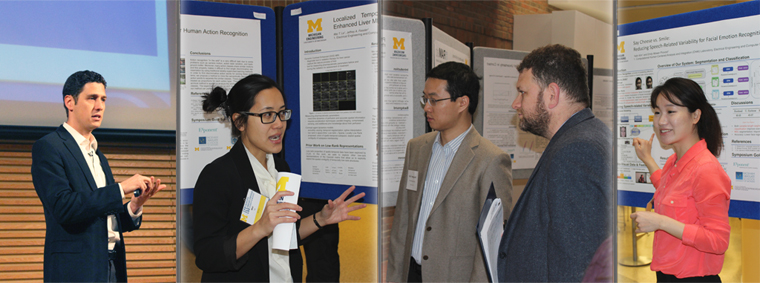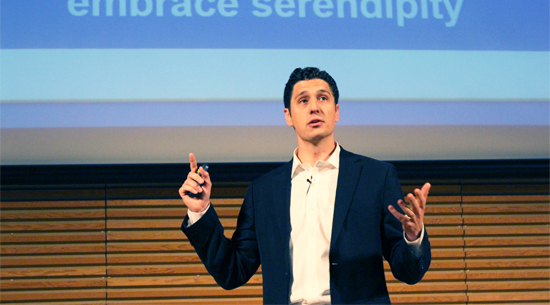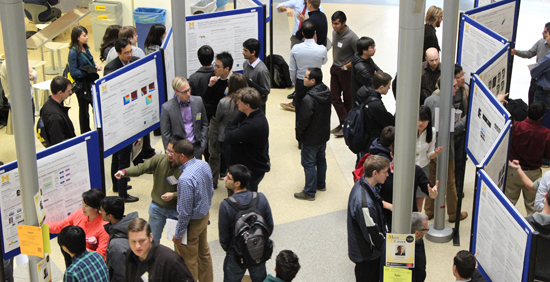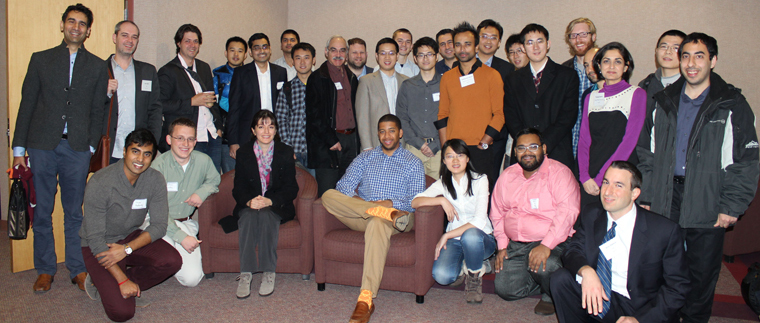ECE students and alumni celebrate research and progress at the 2014 Engineering Graduate Symposium
ECE researchers had a strong presence at this year’s event, comprising nearly 80 of the day’s more than 240 presentations.

 Enlarge
Enlarge
| View the Photo Gallery |
New ideas abounded at the 2014 Engineering Graduate Symposium, the College of Engineering’s annual event to highlight research and engage prospective graduate students. ECE researchers had a strong presence at this year’s event, comprising nearly 80 of the day’s more than 240 presentations. Cheng Zhang, a graduate student in electrical engineering, co-chaired the symposium alongside Karen Schroeder (biomedical engineering).
Presenters in ECE explored a broad spectrum of subjects this year. Research topics included:
- Developing brushless DC motor controller for modular robots
- Improving the memory of extremely small systems with straintronics, a “new frontier of magnetic memories”
- Integrating renewable sources into large electricity networks while maintaining optimal power
- Detecting vulnerabilities in power grids
- Answering an industry demand for high power density machines
- Improving the safety of hydraulic fracturing, or fracking
- Incentivizing investments in security
- The Internet’s effect on network security
- Colorful, transparent photovoltaic cells
Scott Hanson (BSE MSE PhD EE ’04 ’06 ’09) began the day’s events as one of two keynote speakers and this year’s recipient of the Arbor Networks Ph.D. Research Impact Award. In his address, Dr. Hanson discussed the founding of his company, Ambiq Micro, which specializes in the development of low-power semiconductors.

 Enlarge
Enlarge
Dr. Hanson described his experiences launching a startup company before a full audience of prospective grad students, faculty, and staff in Stamps Auditorium.
“Starting out, I realized I don’t know what a CEO is supposed to do,” he said. “So it was very important for me to go out and hear stories in order to serve as one of those people myself.”
He also spoke about the future of millimeter-scale computing and the Internet of Things and how his company works to make them a reality. Ambiq Micro, he explains, is an abbreviation of “Ambient IQ,” referring to a computerized intelligence that may one day be present in every part of our lives.
As part of the Arbor Networks Award, Dr. Hanson received a $7,500 prize, and was presented with a plaque after his address.

 Enlarge
Enlarge
The EECS building and Dunderstadt Center hosted the day’s poster sessions, featuring the work of graduate students in every division of the College of Engineering.

 Enlarge
Enlarge
Thirteen ECE alumni were invited back to campus to judge the poster presentations, meet with students, and enjoy a casual reception at the end of the day. The following alumni were present: Onur Bakhir (Principle Software Engineer, Cadence Design Systems), Pamela Bhatti (Associate Professor, Georgia Tech ECE), Kevin Carter (Assistant Group Leader, MIT Lincoln Library), Eric Dattoli (Fault Isolation Engineer, Intel), Navid Ehson (Systems Engineer, Qualcom), Allan Evans (Co-founder and CTO, Avegant), Sid Ghosh (Senior Principle Systems Engineer, Raytheon), Eric Karl (Memory Circuit Technology Group Leader, Intel), Keving Holt(Research Scientist, Varian Medical Systems), Hongwei Liao (Research Engineer, GE Global Research), Sharhrzad Naraghi (Senior IC Design Engineer, Tektronix Component Solutions), Mitchell Rhode (Co-founder and CEO, Quantum Signal), and Lora Schulwitz(Principle Engineer, General Dynamics).
Technical Session Awards
The following graduate students earned awards for their research projects in areas of research associated with Electrical and Computer Engineering:
Control, Robotics, and Mechatronics:
Maruthi Ravichandran (EE:Sys) – 2nd place, for “Resilient Monitoring Systems: Protecting Critical Infrastructures against Cyber-Physical Attacks.” Advised by Semyon Meerkov.
Applied Physics, Photonics, and Solid-State Devices:
Chu-Hsiang Teng (EE) – 1st place, for “Polarization-controlled Single Photon Emission from Site-controlled InGaN Quantum Dots.” Advised by PC Ku.
Md Zunaid Baten (EE) – 2nd place, for “High Temperature Electrically Pumped Polariton Lasers.” Advised by Pallab Bhattacharya.
Signal and Image Processing:
Joel LeBlanc (EE:Sys) – 1st place (tie), for “Joint Camera-Blur and Pose Estimation from Aliased Data.” Advised by Alfred Hero.
Tianpei Xie (EE:Sys) – 1st place (tie), for “Multi-sensor classification via Consensus-based Multi-view Maximum Entropy Discrimination.” Advised by Alfred Hero.
Duc Le (CSE) – 1st place (tie), for “Modeling Pronunciation, Rhythm, and Intonation for Automatic Assessment of Speech Quality in Aphasia Rehabilitation.” Advised by Emily Mower Provost.
Applied Electromagnetics and Plasma Science:
Fatemeh Akbar (EE) – 2nd place, for “Design of Low Complexity Integrated Phased Arrays.” Advised by Amir Mortazawi.
Integrated Circuits, VLSI, and Microsystems
Azadeh Ansari (EE) – 1st place, for “An 8.7 GHz Temperature-Compensated Gallium Nitride Micromechanical Resonator.” Advised by Mina Rais-Zadeh.
Stacy Yemin Tang (EE) – 2nd place, for “Technology for Fabricating Dense 3-D Microstructure Arrays for Biomimetic Hair-Like Sensors.” Advised by Khalil Najafi.
Power and Energy:
Jonas Kersulis (EE:Sys) – 1st place, for “Instanton Analysis: Understanding Wind-related Transmission Grid Vulnerability.” Advised by Dr. Ian Hiskens.
Erik Miehling (EE:Sys) – 2nd place, for “Multi-Area Energy Trading Process under Localized Externalities.” Advised by Demosthenis Teneketzis.
System and Communication Engineering:
Mohammad Rasouli (EE:Sys) – 1st place (tie) for “”A Supervisory Control Approach for Dynamic Cyber-Security.” Advised by Demosthenis Teneketzis.
Xiang Yin (EE:Sys) – 1st place (tie), for “Synthesis of Supervisors for Centralized and Decentralized Discrete-Event Systems.” Advised by Stephane Lafortune.
Engineering in Biological Systems:
Daniel Egert (EE) – 2nd place, for “Intracortical Neural Probes with Self-Deployed Electrodes.” Advised by Khalil Najafi.
Read more about the work of these and other presenters in the Book of Abstracts.
2013 Engineering Graduate Symposium – ECE
2012 Engineering Graduate Symposium – ECE
2011 Engineering Graduate Symposium – ECE
 MENU
MENU